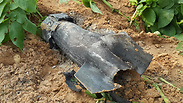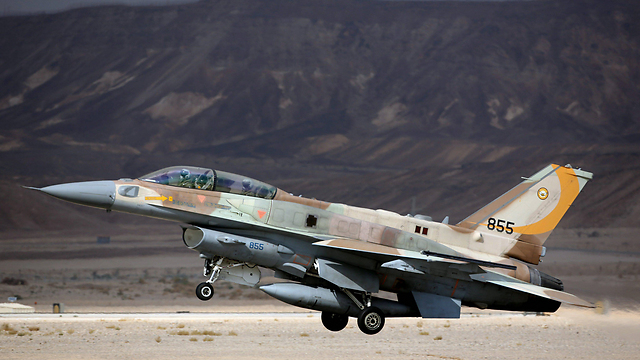
Gaza rocket could start a fire
Analysis: Since end of Operation Protective Edge, Israel has favored calm in Gaza vicinity over renewed conflict with Hamas. But fiery elections in Israel and shaky humanitarian and political situation in Strip may lead to security deterioration.
Indeed, General Staff bodies which require a longer preparation period than the regional commands, such as bodies involved in operations and logistics, have already issued orders for a possible military conflict.
On the background of this evaluation of the situation, every fire started by Hamas, the Palestinian Authority or Israel is seen in an aggravated form – even if it is just a restricted local incident which should not have immediate implications on the region's security.
The security deterioration in the Gaza Strip over the weekend, after an organization which is allegedly not affiliated with Hamas fired a short-range rocket into Israel, should be seen in the same manner.
At the moment, it's unclear whether the rocket was fired as part of a rocket test or intentionally, and whether Hamas was aware of it or not. In any event, although the rocket did not cause any damage, Israel saw it as an opportunity to send a signal to Hamas from a completely different angle by bombing a cement factory.
Israeli officials are concerned by the possibility that some of the tens of thousands of tons of construction material, which will flow into the Strip as part of its reconstruction process, will reach Hamas' cement factories and will be used to rebuild the tunnels.
That is why the State of Israel, which promised its citizens that Operation Protective Edge would curb Hamas' armament, sent the Air Force to the southern Strip and killed two birds with one stone: It also satisfied the public's demand for an immediate response to the rocket fire from Gaza, and also took care of a factory which produces the plates for the tunnels' concreting.

In practice, since the end of the fighting in late August, Israel favored the calm in the Gaza vicinity over dealing with Hamas' military rehabilitation process. No one is naïve here: Israel saw that Hamas was rebuilding its power, but preferred the calm over a resumption of the conflict.
We should only hope, therefore, that the change in the Israeli policy we witnessed over the past weekend has nothing to do with the upcoming elections and only stems from clear security-related considerations.
An election period, in general, is a time when one should be particularly cautious, as it is characterized by a manipulative use of intelligence information by all political streams.
On the first week of the ceasefire, Foreign Minister Avigdor Lieberman announced that Hamas had begun rebuilding the tunnels, while Defense Minister Moshe Ya'alon denied it. Since then, the tunnel reconstruction issue is still providing ammunition for politicians from this side and that side, and has become a political taunting tool from the moment elections were declared in Israel.
Even today, the picture of the resumed excavation in Gaza's tunnels is not entirely clear. There is no doubt that the digging is not taking place in the same magnitude and pace of the period before Operation Protective Edge, and although it's clear that Hamas is very interested in rebuilding the tunnels and the rocket system, the organization's abilities have been significantly reduced.
Raw materials barely arrive, so the continuation of the rocket production is based on existing raw materials. When rockets are fired into the sea, they are usually not testing new models of rockets but rather existing production series.
The attempts to renew the ties with Iran for the purpose of supplying equipment and money have only just begun. A Hamas delegation led by Imad Alami, a member of the organization's supreme council who left the Strip during Operation Protective Edge after losing his leg and moved to Turkey, arrived in Iran 10 days ago. At the moment, these meetings have not led to any practical results.
In the meantime, Hamas is busy rebuilding the tunnels located within the Strip, which serve its fighting in the constructed area. It is reviewing the situation of its offensive tunnels, whose purpose is to infiltrate Israel, and it is very possible that it is also reviving tunnels which were partially destroyed by the IDF or has even started digging new ones.
In addition, we should always take into consideration the possibility that there is one tunnel or several tunnels that the IDF was unaware of and is unaware of till this very day.
Nonetheless, the picture political sources in Israel are trying to paint, that Hamas has restored its pervious abilities in terms of the tunnel warfare, is far from reality.
IDF officials are repeating the mantra that Hamas is not interested in a new military round. Mousa Abu Marzook, the deputy Hamas leader who currently resides in Cairo, also said last week in a public interview: "We are not looking for any war now. We want to rebuild the Gaza Strip."
On Saturday, after the IDF strike in the Gaza, he added that Hamas was working vis-à-vis all the organizations in the Strip to maintain the ceasefire and not to allegedly give Israel a reason to strike again.
But the bottom line is that we are facing a reality of tempestuous elections in Israel on the one hand, and a shaky humanitarian and political situation in the Strip on the other hand – two ingredients which could lead to the deterioration predicted by the Military Intelligence Directorate.










